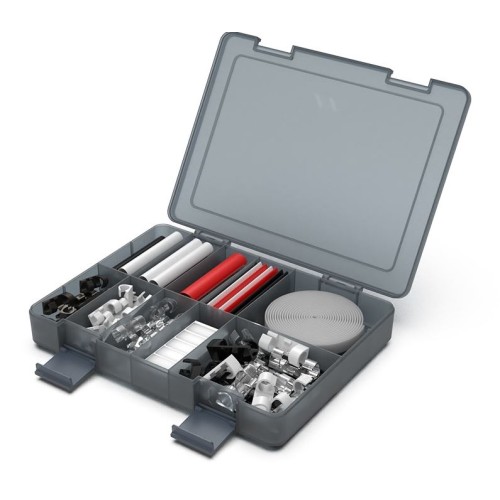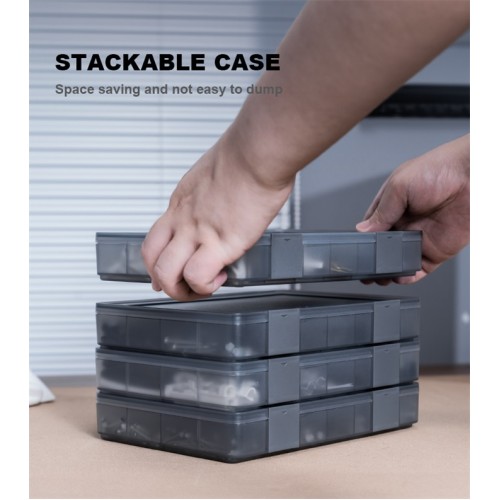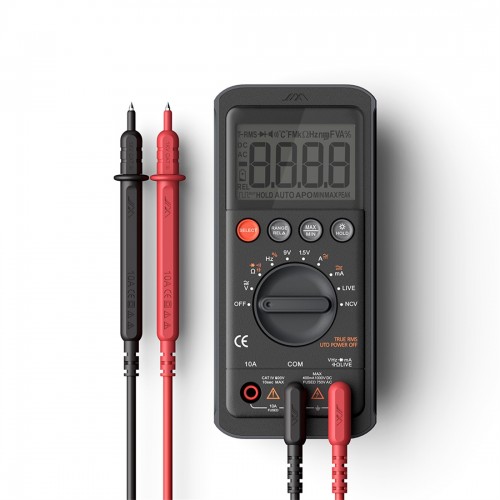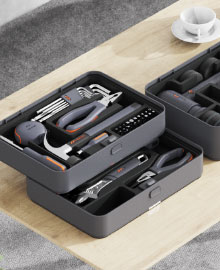
A well-filled tool chest is a technician's key asset for common duties like sizing wood and attaching screws with accuracy. This resource gives insight to opt for correct tools and apply them successfully.
- Commence by gathering a core array of hand tools: hammer, screwdriver, wrench, pliers, saw, tape measure.
- Learn the role and practical uses of every tool for specialized tasks.
- Develop techniques through active projects, gradually making tasks more complex.
Bear in mind that time spent learning hand tools enhances your skillset. With solid understanding, tools extend your capabilities, letting you achieve complex projects confidently.
Power Up Your Projects: Exploring Power Tools
Want to boost outcomes? Enter the powerful realm of tools that combine accuracy and efficiency. These critical tools can upgrade your craft for both experienced workers and hobbyists. From heavy drills to precision cutting saws, power tools bring numerous capabilities for building projects.
- Use cordless impact drivers for efficient fastening and teardown tasks.
- Learn to operate reciprocating saws for swift and tidy cutting of varied materials.
- Elevate your woodworking skills with powerful planers and jointers for smooth and precise finishing.
Use power tools to streamline timelines and deliver remarkable project results.
Accuracy Made Accessible
In environments valuing finesse, the correct measuring devices determine success. From classic rulers to modern laser instruments, these tools provide dependable precision for projects. Whether experienced pro or novice maker, learning these tools unlocks broader potential.
- Explore the diverse range of measuring tools available for every need.
- Learn the specific uses and benefits of each type of tool.
- Develop your skills in accurate measurement and application.
Complete Sets for All Tasks
Regardless of experience level, the right collection of tools is necessary for project success. For diverse tasks including assembly and fastening, the perfect toolset supports accuracy and safety. Investigate your frequent project types to determine the best tool match.
Will a comprehensive multi-tool set be useful or is a specialized kit sufficient? Once needs are set, examine brands and models for comparative quality, functionality and cost. Read feedback from other buyers online to collect practical advice prior to choosing.
Through research and planning you'll identify the ideal kit to complete projects confidently.
Hand Tool Maintenance: Keeping Your Gear in Top Shape
Proper maintenance of hand tools is vital for consistent workmanship. Forgoing maintenance results in blunt tools, broken pieces and frustrating projects. Frequent servicing keeps tools functioning at peak and prolongs lifespan. Start by cleaning your tools after each use to remove dirt and debris. Keep tools stored dry to avoid rust and corrosion.
- Sharpen cutting tools consistently with a stone or fine file.
- Lubricate moving parts with appropriate oil to reduce friction and wear.
- Inspect grips routinely for wear and substitute damaged handles as necessary.

Applying these simple maintenance practices improves tool durability and your overall work experience.
Fundamental Hand Tools for Your Workshop
A well-stocked home workshop provides a perfect space for hobbyists and makers. While specialty tools can be useful, having a solid foundation of essential hand tools is key to tackling a wide range of projects. Vital tools include a solid hammer, an adaptable wrench and a trustworthy tape measure for accurate gauges. Remember to have varied screwdrivers, pliers for manipulation and a utility knife for slicing materials. A reliable saw enables accurate cuts while a level maintains straight, even results.
- Core Tools for Your Home Workshop

Power Tool Safety Essentials: A Full Guide
Power tools are influential devices that supply major power and operational efficiency. However, these formidable machines also require a deep understanding of safety protocols. Neglecting proper precautions can lead to serious injuries. This guide aims to demystify power tool safety, equipping you with the knowledge and practices needed to work safely.
Begin by familiarizing yourself with your tools. Read the manuals carefully, and understand the specific safety features. Always don recommended PPE: goggles, hearing protection and work gloves. Carry out routine maintenance to keep tools functioning properly.
Bear in mind safety is the top priority in any workshop environment. By following these guidelines, you can work with power tools safely and confidently.
Choosing Measuring Instruments for Precision
When pursuing precise measurement outcomes, tool selection yields a major impact. A diversity of measuring devices is offered, each purpose-built for specific needs. Comprehending measurement tool traits is vital for proper choice. Assess attributes such as accuracy, resolution and measurement range while selecting instruments.
- For length accuracy, a tape measure or ruler is usually the go-to tool.
- Use a protractor for indispensable angle measurements.
- Digital calipers provide ideal precision for small-size measurements.
Choosing measurement tools prudently yields repeatable, reliable accuracy.
Selecting Your Ideal Ultimate Tool Set

The journey to pick a tool set can be invigorating and a bit daunting. As options multiply, feeling overwhelmed is understandable. This comprehensive guide will equip you with the knowledge needed to make the perfect set for your needs.
Firstly, identify the project kinds you'll be engaging in. Are you experienced or a novice? Clear goal definition helps refine options.
- Don't be afraid to combine blend utilize both power and hand tools for a successful productive efficient outcome Mixing hand and power tools often yields the best, most efficient outcomes Utilize both categories of tools to achieve efficient, successful project results
- Prioritize the essential tools
- A durable hammer or mallet and sledgehammer option
- An adaptable collection of screwdrivers, wrenches and pliers is crucial
- Measuring tools including tape and ruler
- Level Plumb Bob Transit
Additional factors to weigh are tool materials, budget limits and brand standing. Remember that investing in a durable tool set is an investment in the long term.
DIY Simplified: Effective Tool Use
Embarking on your first DIY project can seem daunting. But don't worry—using suitable tools and some know-how makes tough tasks manageable. Initiate by getting familiar and learning tool operations. Review guides carefully and practice fundamental techniques in a secure environment. Safety should remain your topmost concern at all times. Use proper protective apparel—safety glasses, gloves and ear protection—to guard against risks.
Choosing tools, pay attention to durability and structural sturdiness. Choose dependable brands that consistently provide tools that last.
Seek advice from experienced DIYers or store professionals when unsure. These experts offer valuable recommendations and insights to choose the best tools for your tasks.
- Always use sharp tools for safer, cleaner work.
- Organize your tools for easy access and longevity.
- Try new DIY activities to develop abilities and confidence
Choosing Power or Hand Tools: A Practical Guide
For a project, deciding between power and hand tools might feel like a tough dilemma. Despite power tools' efficiency and strength, hand tools still are essential for accuracy and small-scale jobs. Here's a breakdown guide to help you select choose pick the right option tool equipment for the job.
- For detailed, precise work—carving, fitting, intricate fixes—hand tools are ideal. These tools offer heightened control and usually come at a lower cost.
- When projects require fast cutting, drilling or sanding, power tools markedly reduce time and effort. They markedly minimize labor and accelerate completion times.
Ultimately, the right tool choice depends on the particular job, your experience and budget. Don't be afraid to combine blend utilize both power and hand tools for a successful productive efficient outcome.
